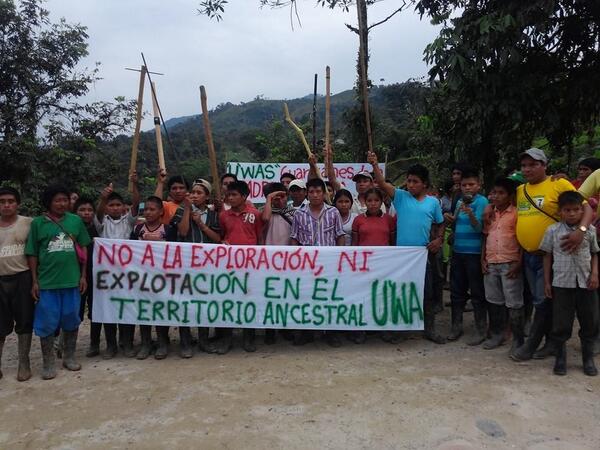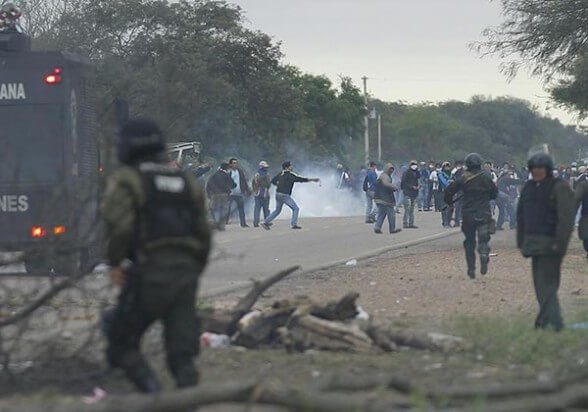
by DGR Colorado Plateau | Dec 26, 2015 | Lobbying, Toxification
Featured Image: Alali Efanga & Chief Fidelis Oguru from Oruma, two plaintiffs in the Dutch court case against Shell. (Photo: Milieudefensie/flickr)
In a potentially precedent-setting ruling, a Dutch court said Friday that Royal Dutch Shell may be held liable for oil spills at its subsidiary in Nigeria—a win for farmers and environmentalists attempting to hold the oil giant accountable for leaks, spills, and widespread pollution.
The ruling by the Court of Appeals in the Hague, which overturns a 2013 decision in favor of Shell, allows four Nigerian farmers to jointly sue the fossil fuels corporation in the Netherlands for causing extensive oil spills in Nigeria.
The scars of those disasters are still visible in the fields and fishing ponds of three Nigerian villages. In one village, drinking water has been rendered non-potable, while in another, an entire mangrove forest has been destroyed.
Alali Efanga, one of the Nigerian farmers who, along with Friends of the Earth Netherlands, brought the case against Shell, said the ruling “offers hope that Shell will finally begin to restore the soil around my village so that I will once again be able to take up farming and fishing on my own land.”
Beyond that, the court’s decision “is a landslide victory for environmentalists and these four brave Nigerian farmers who, for more than seven years, have had the courage to take on one of the most powerful companies in the world,” said Geert Ritsema, campaigner at Friends of the Earth Netherlands. “This ruling is a ray of hope for other victims of environmental degradation, human rights violations, and other misconduct by large corporations.”
Indeed, as Amnesty International researcher Mark Dummett said in advance of the ruling: “This case is especially important as it could pave the way for further cases from other communities devastated by Shell’s negligence.”
“There have been thousands of spills from Shell’s pipelines since the company started pumping oil in the Niger Delta in 1958,” Dummett said, “with devastating consequences for the people living there.”
Decrying the “incredible levels of pollution” caused by the activities of Shell and its subsidiaries, environmentalists Vandana Shiva and Nnimmo Bassey said at a media briefing in July that “weekends in Ogoniland are marked by carnivals of funerals of people in their 20s and 30s.”
Citing a 2011 United Nations Environmental Programme assessment, they noted that in over 40 locations tested in Ogoniland, the soil is polluted with hydrocarbons up to a depth of 5 meters and that all the water bodies in the region are polluted.
The UN report, they said, also found that in some places the water was polluted with benzene, a known carcinogen, at levels 900 above World Health Organization standards. “With life expectancy standing at about 41 years, the clean up of Ogoniland is projected to require a cumulative 30 years to clean both the land and water,” they said.
In another historic victory for the plaintiffs, the Hague court on Friday also ordered Shell to give the farmers and environmental activists supporting their case access to internal documents that the court said could shed more light on the case.
Channa Samkalden, counsel for the farmers and Friends of the Earth, said it was “the first time in legal history that access to internal company documents was obtained in court…This finally allows the case to be considered on its merits.”
The court will continue to hear the case in March 2016.
This work is licensed under a Creative Commons Attribution-Share Alike 3.0 License
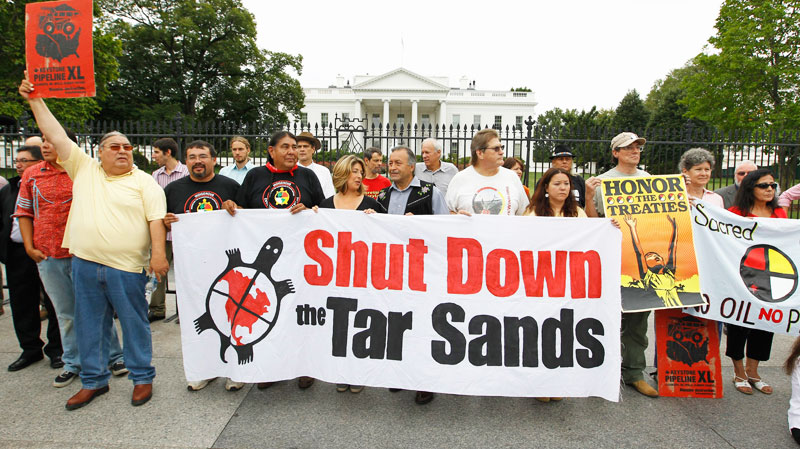
by Deep Green Resistance News Service | Nov 12, 2015 | Strategy & Analysis
by Clay Cochran / Deep Green Resistance
“The woods are lovely, dark and deep,
But I have promises to keep,
And miles to go before I sleep,
And miles to go before I sleep.”
-Robert Frost
President Obama announced Friday morning that he has denied TransCanada’s permit application to build the Keystone XL (KXL) oil pipeline in the U.S. Many in the mainstream environmental movement hailed this as a positive seismic shift in public policy and public perception, and a harbinger of the inevitable saving of our planet. Were it only that simple. Unfortunately, although the denial of the KXL build is in itself a good result, it carries with it some insidious dangers to the continuation of the fundamental work of saving this planet.
It is understandable that many think Obama’s denial of the KXL is a huge victory for the environment. Sadly, that view is myopic, and typical of the wishful thinking hampering the environmental movement around the world. The denial of the KXL does not accomplish what we ultimately need: the shutting down of the entire industrial, fossil-fuel driven society murdering the planet.
Unfortunately, the history of the environmental movement has many incidences where small victories have caused a loss of focus on the big picture, or otherwise misdirected us into falsely believing the one-off accomplishment sufficient to save our planet. Make no mistake, we must be ever vigilant not to let the leaders of industrial civilization (i.e. the greedy, patriarchal, conscious-less ‘leaders of industry’ and their paid-for politicians and mainstream media) characterize the globally suicidal events that are unfolding. They will always use a deceptive framework supporting their relentless need for unsustainable expansion, and lead many into losing sight of the ecologically desperate times that we are facing.
Deep Green Resistance believes the only way our planet can be saved for all species is for the current patriarchal and industrial civilization to be immediately dismantled. We also believe there is grave danger in premature self-congratulation for small accomplishments that seemingly are a win for the environment, but in truth do nothing to alter the existing paradigm of corporate power or slow the inevitable march towards unsustainable expansion and the murder of the planet. Simply stated, the processes that have been put in motion ― runaway climate change, population overshoot due to industrial agriculture, species extinctions, and ‘resource’ extraction ― are far too developed to be stopped by any means that allows the industrial complex to remain in existence.
In the book Deep Green Resistance, co-author Lierre Keith writes
”The culture of the left needs a serious overhaul. At our best and bravest moments, we are the people who believe in a just world; who fight the power with all the courage and commitment that women and men can possess; who refuse to be bought or beaten into submission, and refuse equally to sell each other out. The history of struggles for justice is inspiring, ennobling even, and it should encourage us to redouble our efforts now when the entire world is at stake. Instead, our leadership is leading us astray.”
Our leadership continues to lead us astray. President Obama gives lip service to his concern for global climate change guiding this KXL denial decision, but the truth is hidden in his message. According to a Scientific American article, among his reasons for rejection were that
…the pipeline would not make a meaningful long-term contribution to the U.S. economy, nor would it increase U.S. energy security or help to lower gas prices, which have already declined dramatically over the last year.
With these criteria for making his decision, we’re clearly not ready to take a victory lap for the environmental awakening of the global leadership.
Also in the DGR book, the authors discuss Lester Brown’s Plan B: Mobilizing to Save Civilization, pointing out that “although Mr. Brown is to be [commended] for understanding that the problems our planet is facing are systemic and interrelated, [his plan] unfortunately falls prey to what many other ‘plans’ do; it leaves the overlapping accelerants of capitalism, industrialization, and civilization in place.”
With the KXL decision in the news, it is critical to keep in mind the myriad disastrous ‘projects’ which continue unabated. As the DGR authors warn, these other projects evidence the hard truth that, so far, the work of the environmental movement has indeed left capitalism, industrialization, and civilization firmly in place. That three-headed monster has no intention of voluntarily leaving us to salvage what is left of our biosphere, so we are left with no other alternative than to terminate it ourselves, and with extreme prejudice.
A recent article in the Financial Post states:
While TransCanada Corp. has been cooling its heels on its Keystone XL proposal for the past six years, the oil pipeline business has been booming in the United States. Crude oil pipeline mileage rose 9.1 per cent last year alone to reach 66,649 miles. […] Between 2009 and 2013, more than 8,000 miles of oil transmission pipelines have been built in the past five years in the U.S., […] compared to the 875 miles TransCanada wants to lay in the states of Montana, South Dakota and Nebraska for its 830,000-bpd project. By last year, the U.S. had built 12,000 miles of pipe since 2010.
[AOPL spokesperson John Stoody said] “While people have been debating Keystone in the U.S. we have actually built the equivalent of 10 Keystones. And no one’s complained or said anything.”
A Climate Central article discusses the many alternative plans already developed to transport the tar sands of Canada:
As a way around those challenges, other pipelines are in the works. One pipeline is already operating and sending hundreds of thousands of barrels of tar sands bitumen to Texas every day.
Experts, such as Stephen Kelly, a former U.S. diplomat and a visiting professor of public policy and Canadian studies at Duke University, say that the long-term outlook for Canadian oil sands production is not closely linked to the fate of Keystone XL.
“Canada has ample financial incentive to find ways to get its oil to world markets, and it’s likely to find ways to build pipelines to its coast, despite opposition,” he said last year.
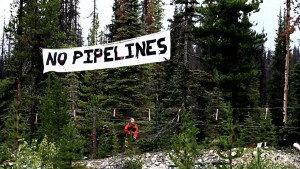 The Keystone XL decision and its accompanying self-congratulations should be a warning to us all not to lose sight of the big picture. The Keystone XL alternatives do face opposition in Canada from overlapping groups of climate activists, grassroots environmentalists concerned about local impacts, and First Nations peoples, with the Unis’tot’en Camp a prime example of a coalition for active on-the-ground resistance. We must remain vigilant in fighting pipelines and other infrastructure expansion projects wherever they’re proposed, and be skeptical of any misdirection from the fundamental work of ending the industrial-patriarchal complex.
The Keystone XL decision and its accompanying self-congratulations should be a warning to us all not to lose sight of the big picture. The Keystone XL alternatives do face opposition in Canada from overlapping groups of climate activists, grassroots environmentalists concerned about local impacts, and First Nations peoples, with the Unis’tot’en Camp a prime example of a coalition for active on-the-ground resistance. We must remain vigilant in fighting pipelines and other infrastructure expansion projects wherever they’re proposed, and be skeptical of any misdirection from the fundamental work of ending the industrial-patriarchal complex.
There is some good news. Deep Green Resistance believes that the insanity of the industrial planet-killing machine can be stopped. We believe that a sustainable and just world can be achieved, and we can transition away from being a consumer society. The Deep Green Resistance strategy of Decisive Ecological Warfare (DEW) is a recognition of the scope of what is at stake (the planet); an honest evaluation of the potential for a mass movement (none); and an assessment that industrial civilization depends on highly vulnerable infrastructure.
DEW keeps front-and-center the understanding that there will be no comprehensively successful environmental actions if we allow the current industrial framework to remain in existence. The people in power who are driving 200 species to extinction each day have no qualms about leading humans to the same fate, and show no signs of voluntarily altering their behaviors. It is well past time to make them stop.
I urge you to take a look at the Deep Green Resistance website and to reflect on the future of this planet. The Decisive Ecological Warfare strategy is multifaceted and needs your help, with work to be done wherever your skill set and interests lead you. Get involved and save our home.
If you’d like to read more analysis like this, and news of grassroots resistance to environmental destruction, sign up at the upper left of this page to receive email notifications of new posts.
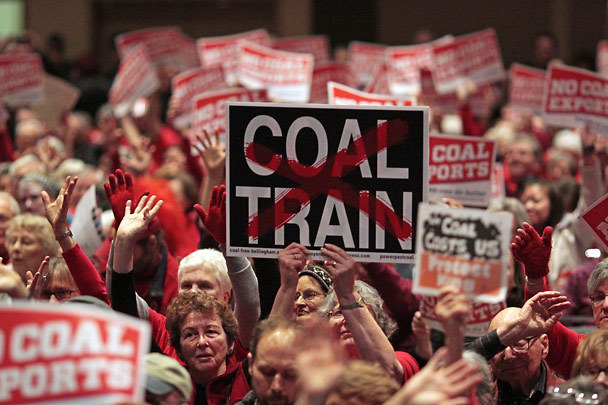
by Deep Green Resistance News Service | Jul 28, 2015 | Climate Change, Lobbying, Strategy & Analysis
By Thomas Linzey / CELDF
Four years ago, as we were leaving Spokane to help rural Pennsylvania communities stop frack injection wells and gas pipelines, this region’s environmental groups couldn’t stop talking about “stopping the coal trains.”
After people in British Columbia – including NASA’s top climate scientist James Hansen – were arrested for blocking oil trains; and after people in Columbia County, Oregon have now proposed a countywide ban on new fossil fuel trains, one would think that both the Spokane City Council and the region’s environmental groups would have begun to take strong steps here to, well, actually stop the coal trains.
After all, there is now almost universal agreement that the continued use of fossil fuels threatens almost every aspect of our lives – from scorching the climate to acidifying the oceans and fomenting widespread droughts.
But it seems that both the Council and this region’s environmental groups have resigned themselves to being silent accomplices to this slow-moving disaster.
A few weeks ago, at a forum on coal and oil trains, rather than propose a citywide ban on oil and coal trains, those groups instead focused on the dangers of train derailments and coal dust – two real issues to be sure – but ones that fall completely short of recognizing the underlying problems posed by the trains.
If the problem is derailments and dust, then the solution is to reinforce and cover the railroad cars. That may or may not happen, but even if it does, it doesn’t solve the fundamental problem posed by the coal and oil trains. Instead, such a stance broadcasts the message from the City of Spokane and this region’s environmental groups that the coal and oil trains are okay as long as they are “safe.”
The real problem, of course, is that the fossil fuels that the oil and coal trains carry – when used the way they are intended to be used – can never be made “safe” because their guaranteed combustion is slowly boiling the very planet on which we live.
At the end of Spokane City Council President Ben Stuckart’s presentation at the forum last week, he spoke about his dead-end meetings with state and federal officials, whose doors were open to the energy and railroad corporations but not to communities affected by the trains. Stuckart declared that he wasn’t sure that anything short of laying down on the tracks would stop the coal and oil trains.
For one brief shining moment, it seemed that the heavens had parted and what we’re really up against – a governmental system controlled by the very corporations it is ostensibly supposed to regulate – came shining through.
As I watched, people across the room began to shout and applaud; and then, just as quickly as it had come, it passed, as the hosts of the forum steered everyone back to their latest moving target – this time, urging people to write letters begging Governor Inslee to stop proposed oil and gas exports. In other words, now nicely asking the Governor to stop more oil and coal trains from invading Spokane.
I then realized why I stopped going to those gatherings – I stopped because the form of activism proposed by the groups actually strips us of the belief that we’re capable of doing anything by ourselves, as a community, to actually stop the trains. Writing letters reinforces a hopelessness of sorts – that we’re completely dependent on the decision by others to “save” us, and that we’re incapable of taking action to save ourselves.
It would be akin to the civil rights movement writing letters to congress instead of occupying the lunch counter or the seats at the front of the bus. Or Sam Adams sending a letter to King George urging him to put safety bumpers on the ships carrying tea, rather than having a tea party by dumping casks of tea in the harbor.
Until we confront the energy and railroad corporations directly, they will continue to treat Spokane as a cheap hotel. We need to ban and stop the trains now – using everything that we can – before future generations wonder why we spent so much time sending letters and so little time protecting them.
Thomas Alan Linzey, Esq., is the Executive Director of the Community Environmental Legal Defense Fund and a resident of the City of Spokane. The Legal Defense Fund has assisted over two hundred communities across the country, including the City of Pittsburgh, to adopt local laws stopping corporate factory farms, waste dumping, corporate water withdrawals, fracking, and gas pipelines. He is a cum laude graduate of Widener Law School and a three-time recipient of the law school’s public interest law award. He has been a finalist for the Ford Foundation’s Leadership for a Changing World Award, and is a recipient of the Pennsylvania Farmers Union’s Golden Triangle Legislative Award. He is admitted to practice in the United States Supreme Court, the Third, Fourth, Eighth, and Tenth Circuit Courts of Appeals, the U.S. District Court for the Western and Middle Districts of Pennsylvania, and the Commonwealth of Pennsylvania. Linzey was featured in Leonardo DiCaprio’s film 11th Hour, assisted the Ecuadorian constitutional assembly in 2008 to adopt the world’s first constitution recognizing the independently enforceable rights of ecosystems, and is a frequent lecturer at conferences across the country. His work has been featured in the New York Times, the Los Angeles Times, Mother Jones, the Nation magazine, and he was named, in 2007, as one of Forbes’ magazines’ “Top Ten Revolutionaries.” He can be reached at tal@pa.net.





